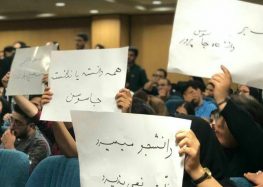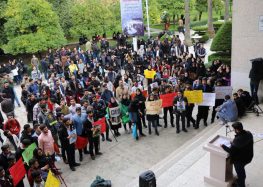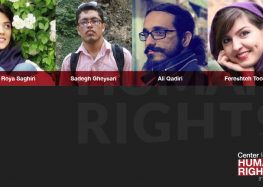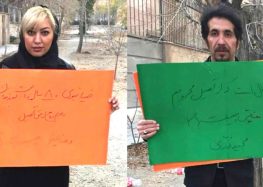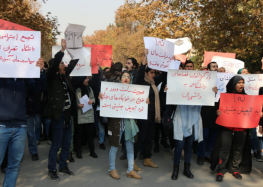Students, MPs Protest Against Rouhani’s Conservative Nominee for Iran’s Science Ministry
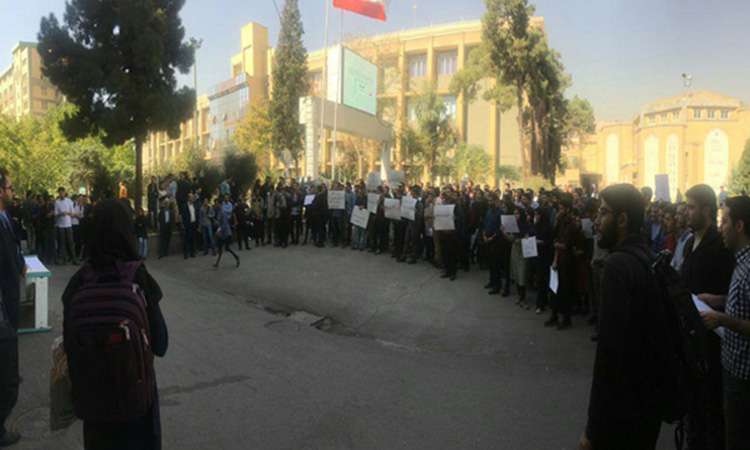
Students protest against President Rouhani’s nominee to head the Science Ministry, Mansour Gholami, at Amirkabir University of Technology in Tehran.
Rouhani’s Previous Nominees Rejected by Supreme Leader
Reformist members of Parliament and Iranian university students have come out strongly against President Hassan Rouhani’s nominee to head the Science Ministry, Mansour Gholami, claiming he supports conservative policies and had previously collaborated with security agencies.
Gholami, 64, has been the chancellor of Bou-ali Sina University in western Iran since 2014. He was formally introduced to Parliament for a vote of confidence on October 22, 2017, more than two months after Rouhani first proposed his cabinet nominees in August. The Deliberations are scheduled for October 29.
The protests against Gholami heading the ministry, which sets policy for higher education and university affairs in the Islamic Republic, began after reports emerged of his possible nomination.
“The news that the head of Bou-Ali University has been nominated for the Science Ministry has led to a wave of criticism and concern among academics and students alike,” tweeted reformist member of Parliament Mahmoud Sadeghi, on October 18, 2017.
Sadeghi had tweeted a day earlier that more than 10 of Rouhani’s other nominees had been rejected by Supreme Leader Ali Khamenei.
According to Article 133 of Iran’s Constitution, “Ministers will be appointed by the president and will be presented to the Assembly for a vote of confidence.”
Before Parliament began deliberations on Rouhani’s nominees, the supreme leader’s official website denied involvement in picking “every single” candidate.
“The leader of the Islamic Revolution is sensitive about some ministries, such as science, education and Islamic guidance, because any deviation by them could deviate the country from the main path toward its ideal goals… but the leader does not interfere in selecting these ministers,” said an analysis posted on the website July 28, 2017.
According to reformist MP Mohammad Reza Tabesh, Gholami was Rouhani’s 20th choice. The list included Elham Aminzadeh, Reza Faraji Dana, Jafar Towfighi, Ali Khaki Sadigh and the ministry’s current head, Zia Hashemi, Tabesh told the Iranian Labor News Agency (ILNA) on October 22.
“The reason why it is taking so long to introduce a nominee for the Science Ministry is because Mr. Rouhani wants the supreme leader’s blessing for all agencies and every appointment and that’s not possible,” said Deputy Parliament Speaker Ali Motahari in a post on the Telegram messaging network on October 20, 2017.
“He is undermining the legislature as the only deciding authority in this matter,” he added.
Student Protests
Students at two campuses in Tehran—Amirkabir University of Technology and Allameh Tabataba’i University—held protests against Gholami’s nomination on October 22. Another protest was held at Qazvin University, west of the capital, also on that day, according to ILNA.
Students and political activists also protested on social media using the Persian hashtag «دانشگاه تنها ست» (university abandoned).
In tweets published on October 20, student activist Mohammad Ali Kamfirouzi, who studies law at Tehran University, described Gholami as an “ineffective conservative” and accused him of reinstating a Bou-Ali University security official widely known for suppressing student protests against the disputed result of the 2009 presidential election.
Student activist Sina Qelich tweeted on October 19 that Gholami had suspended a student even though he had been acquitted of anti-state crimes in court.
“Introducing Gholami for the Science Ministry is a mockery of all the hopes students had when they campaigned during the elections,” added Qelich. “Wake up Mr. Rouhani!”
Rouhani, known as a centrist pragmatist with ties to conservative and reformist factions, received strong backing from university students during his 2013 and 2017 presidential campaigns.
During his May 2017 campaign, he praised students as “ambassadors of knowledge and shining hopes of the future” and urged them to join him with the rest of the nation in achieving “freedom, security, tranquility, and progress.”
“What the universities need is a secure climate, not a security climate,” he said during a speech on Students’ Day at Tehran University on December 7, 2015.
On October 18, 2017, more than 500 student journalists signed an open letter to Rouhani urging him to introduce a minister who supported the moderate policy positions Rouhani touted during his election campaign.
“We must bluntly inform your excellency that some of the nominees mentioned for the Science Ministry have a dark history in suppressing student rights and freedoms,” said the letter.

